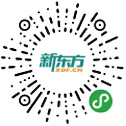课程推荐
学校活动
托福写作:好儿子/女儿的标准 | 西安托福培训点
2019-08-30 12:34
来源:新东方网整理
作者:
托福写作难点话题一览
What makes a good son or daughter?
What are the important qualities of a good son or daughter? Have these qualities changed or remained the same over time in your culture? Use specific reasons and examples to support your answer.
写作思路展开结构分析
这道题目请大家注意审题,不要只注重论述题目的前半句也就是好儿子/女儿应该具备的品质,题目后半句涉及到文化背景的部分大家也要结合到话题展开和论述当中去。比如说中国传统意义上的好儿女常会说到孝道,养老方面的内容,就是很好的展开方向。
本话题高分范文赏析
In traditional Chinese society, a person's most important relationship was that between a parent and a child. The only measure of whether a child was good or bad was whether or not they were obedient to their parents' wishes. Traditionally a Chinese family had many children. Boys were expected to go to school and, after they grew up, to have a son of their own, and to manage the family's affairs. When his parents grew old, a son was expected to live with and care for them. A girl's parents would usually arrange her marriage to someone who she did not love and without consulting her. After she was married, she was no longer a part of her biological family; instead she became an adopted daughter of her husband's family and had to respect her husband's parents as she would her own parents. She was also expected to bear her husband a son. A child who broke these norms, defied or disrespected their parents was seen as worthless or immoral at best, and could legally be killed by their parents in extreme cases. Today of course, China is very different. Chinese children are still expected to respect their parents, but society is not as conservative as it used to be. When a Chinese son gets married, he will often prefer not to live in the same house with his parents, although he might still feel quite obligated to care for them in their old age. The greatest strides have been made by Chinese women, who now hope that their daughters grow up to marry someone that they love, and who is able to take good care of them. The major revolution in the Chinese family since 1980s has been the introduction of the one-child policy. Since Chinese families are now usually only allowed to have one child, the roles of parent and child have almost been reversed! Today's children in China, while still expected to treat their parents with respect, have become the "little emperors and empresses" of their families. Many "little emperors" are so doted on by their immediate and extended families that they become very spoiled, demanding toys, candy, and attention all day long. Because of the changing structure of the Chinese family, the bonds between parent and child, while still of primary importance, are characterized less by rules and respect and more by love.

新东方小程序
查课程、找校区、找老师
版权及免责声明
①凡本网注明"稿件来源:新东方"的所有文字、图片和音视频稿件,版权均属新东方教育科技集团(含本网和新东方网) 所有,任何媒体、网站或个人未经本网协议授权不得转载、链接、转贴或以其他任何方式复制、发表。已经本网协议授权的媒体、网站,在下载使用时必须注明"稿件来源:新东方",违者本网将依法追究法律责任。
② 本网未注明"稿件来源:新东方"的文/图等稿件均为转载稿,本网转载仅基于传递更多信息之目的,并不意味着赞同转载稿的观点或证实其内容的真实性。如其他媒体、网站或个人从本网下载使用,必须保留本网注明的"稿件来源",并自负版权等法律责任。如擅自篡改为"稿件来源:新东方",本网将依法追究法律责任。
③ 如本网转载稿涉及版权等问题,请作者见稿后在两周内速来电与新东方网联系,电话:010-60908555。